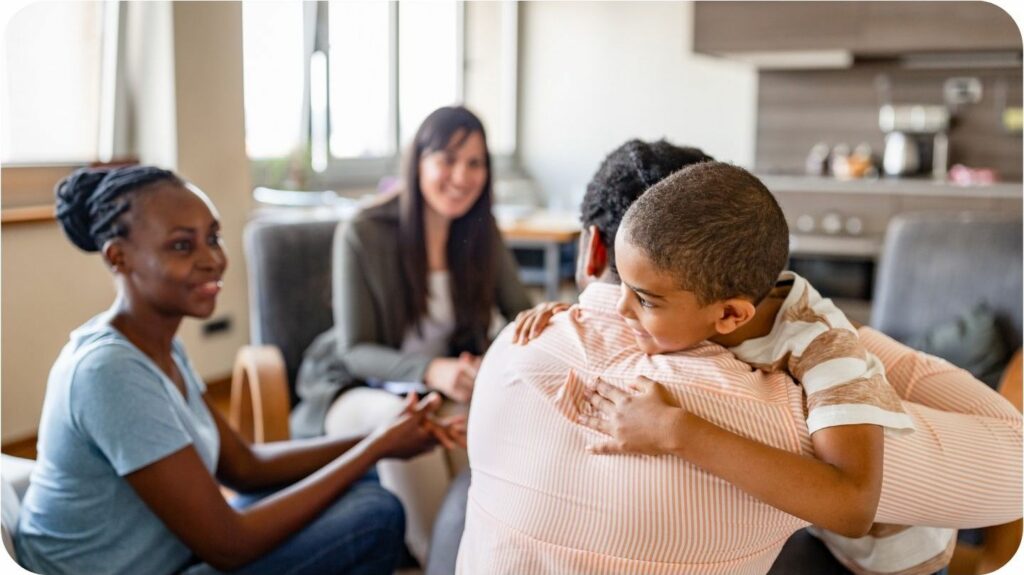Dear CDA Families,
May is Mental Health Month! Since the start of the pandemic, more and more people are talking about mental health and its importance. We recognize how the stress, isolation, and uncertainty throughout the last couple of years has affected our well-being. We have come to realize that our mental health is just as important as our physical health.
What is Mental Health?
Mental Health refers to the state of emotional, psychological, and social well-being. Basically, it means that our mental health can affect how we feel, think, and act in certain situations. When we are in a good state of mental health, we are better able to handle everyday situations and potential challenges.

We will all experience life challenges throughout our lives, and some of us more than others.
Likewise, stress is something we all can relate to, such as job-related stress, financial stress, daily responsibilities, and even major life events such as an illness or divorce. Some stress is good because it keeps us on track and allows us to stay motivated in reaching our goals.
However, too much stress can be harmful and toxic to our social, emotional, and physical health.
When we struggle to handle life’s challenges effectively and with a proper outlook, a mental health disorder might be the cause of the problem. There are many types of mental health disorders, including depression, anxiety disorders, schizophrenia, bipolar, and others.
Remember, taking care of our emotional well-being is just as important as caring for our physical well-being.
Here are some tips to improve your mental health:
Connect with others – spending time with others who are positive, loving, and caring can help us feel part of a family or community, makes us feel accepted, and gives life meaning.
Learn and Practice “Mindfulness” Skills – do you ever think about what you are thinking about? Mindfulness is a form of self-reflection that allows you to focus on your thoughts. It can be done anywhere and at any time. The goal is to focus on the present instead of thinking about the past or worrying about the future. Using this skill is known to lower stress, increase your focus and memory, improve your relationships, and help you feel at ease.
Exercise – should play an important role in your life. Exercising can lower anxiety, improve your sleep, mood, and help you feel more relaxed.
Get enough sleep – Sleeping well is imperative to your overall physical and emotional health.
Eat well – good nutrition can reduce your stress and promote your overall health and well-being. Eating unhealthy foods can cause health problems, such as high blood pressure, heart disease, and diabetes.
Practice self-care – set aside some time each day to focus on self-care. It’s important to take care of your physical, emotional, and mental health by incorporating daily activities you enjoy.
Get the care you need – Addressing mental health symptoms early is critically important for overall health. If you feel like you are struggling, don’t be ashamed or afraid to ask for help.
988 Coming Soon – starting on July 16, 2022, anyone facing a mental health crisis can call 988 and get connected to the National Suicide Prevention Lifeline (also called the Lifeline). In the meantime, if you or someone you know is in crisis, please contact the National Suicide Prevention Lifeline at 1-800-273-8255 or the Crisis Text Line by texting MHA to 741741.
Additional Resources
Mental Health America
Take a mental health screening at mhascreening.org to help you better understand what you are experiencing and get helpful resources. After that, consider talking to someone you trust about your results, and seek out a professional to find the support you need.
Mental Health America San Diego
Mental Health America of San Diego County is dedicated to promoting mental health, preventing mental disorders and achieving victory over mental illnesses through advocacy, education, research and service. The website offers information about local resources, events and trainings, as well as information and treatment options about various mental health disorders organized by audience and issue.
Helpline: 619-543-0412
https://mhasd.org
It’s Up to Us
It’s Up to Us is a campaign designed to empower San Diegans to talk openly about mental illness, recognize symptoms, utilize local resources and seek help.
San Diego Access and Crisis Line:
The SD Access and Crisis Line provides free assistance 7 days a week/ 24 hours a day. Services include confidential support in all languages, crisis intervention and suicide prevention, referrals for mental health and/or alcohol and drug needs, and referrals to other related resources.
Tel: 888-724-7240
https://www.optumsandiego.com
The National Alliance on Mental Illness (NAMI) San Diego
NAMI San Diego offers a Helpline, support groups, educational meetings, and other services on mental illness at various locations throughout San Diego.
NAMI San Diego Helpline: 800-523-5933 or 619-543-1434
NAMI North Coastal: 760-722-3754
https://namisandiego.org
2-1-1 San Diego
2-1-1 SD connects people with community, health, and disaster services through a free, 24/7 phone service and searchable online database.
Tel: 2-1-1
https://211sandiego.org
RI International – San Diego Chapter
RI International provides recovery-based services to adults with mental health and/or addiction challenges and offers free wellness and recovery classes to adults experiencing mental health challenges.
Tel: 858-274-4650
https://riinternational.com/our-services/california/san-diego-home/
Upcoming Workshops
We have some exciting workshops lined up throughout May and June, including:
- May 3rd & 10th – National Conflict Resolution Center: Work Readiness Exchange
- May 17th – Digital Literacy: Intermediate Microsoft Excel
- May 24th – Breaking Down Barriers: Healthy Communication
- June 7th – Intermediate Microsoft Outlook: Mail Merge and File/Folder Creation
- June 14th – National Conflict Resolution Center: Modeling Healthy Adaptation for our Kids
- June 21st – Breaking Down Barriers: Mindfulness & Gratitude
For details, visit our Workshops page using the button below.
Family Resources
For individualized assistance with resources or referrals, please contact our Family Resources Team via the contact form on our workshops page:





